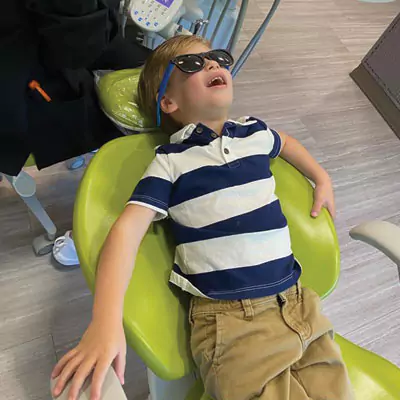
No Insurance? No Worries!
Get unlimited dental care savings for only $79 per year when you enroll in our savings plan.
Learn MorePulpal Therapy
Pediatric Pulpotomy / Pulpectomy in Scottsdale, AZ
What is pulpal therapy for a baby tooth?
If your child’s cavity reaches the nerve tissue inside their tooth (known as the tooth pulp), a procedure called a pulpotomy or pulpectomy will likely need to be performed on it.
This is often referred to as a “baby root canal” and involves removing the affected nerve tissue of the tooth and placing a sedative material in its place. The tooth is then typically covered with a dental crown in order to protect it and restore its strength. This procedure helps preserve the baby tooth until it is time for it to fall out naturally.
Does my child need a nerve treatment?
Our pediatric dentists want your child to retain their baby teeth until the permanent teeth are ready to come in and replace them.
Baby teeth serve several important functions such as helping in chewing and speaking and preserving space for their permanent tooth replacements.
Nerve treatment procedures can also prevent the spread of bacterial infection from your child’s tooth to avoid unnecessary pain and potential permanent tooth damage.
Let us help keep your child pain free!
At Arcadia Pediatric Dental we are dedicated to helping children maintain healthy smiles. If your child has a toothache, schedule an appointment with one of our pediatric dentists as soon as possible by clicking HERE or calling us at (480) 207-5070.
Related FAQs
Of course! Not only do we allow parents to stay with their kids during exams and most treatments, we encourage it. We have found that having a parent stay with their child lessens the anxiety for both the child, as well as the parent. Younger patients will often lay in their parent's lap during the exam to provide the most soothing experience.
Also, being with your child during their dental appointment allows the dentist and parent to discuss their child's dental health and provide realtime feedback and tips.
The only exception is during General Anesthesia. Parents are able to be with their child when they fall asleep and wake up, but not during treatment. The treatment room is small and with the dentist, dental assistant and the anesthesiologist, the room is just too crowded to provide the safest environment for your child. During this time, you are asked to wait in the lobby. The office staff will bring you updates during treatment.
If your child has received local anesthesia to complete their dental work their lips, cheeks, and tongue will remain anesthetized (numb) for a few hours following their appointment. Because they cannot feel these areas, sometimes children will accidentally bite them which causes them to swell. It is very important to monitor your child closely after their dental appointment and remind them not to suck, bite or chew on their lips, cheeks or tongue. Cold liquids, ice packs, or frozen treats (popsicles) will help provide pain relief if this occurs. If your child has any swelling following their dental appointment, please contact our office so it can be evaluated.
Monitoring your child’s diet and oral hygiene are important factors in preventing dental decay. We recommend helping your child brush their teeth twice a day and floss any teeth that are touching nightly. A good rule of thumb is if your child can cut meat into perfect squares they likely have the manual dexterity to start brushing and flossing on their own.
When your child is ready for this transition, we recommend you continue to supervise their oral hygiene. After nighttime brushing and flossing, only allow your child to have water before bed. Never allow your child to sleep with juice or milk overnight. Frequent sipping on sweet drinks (juice, soda, sports drinks) can increase your risk of getting cavities. Try to limit these types of beverages as much as possible. Drinking water with meals or after snacks helps wash off the food and sugars from teeth and is especially important if your child is drinking sugary beverages.
While breastmilk alone does not cause cavities, after your child’s teeth have erupted breastfeeding in combination with carbohydrates and sugars can cause cavities. It is important to begin brushing your child’s teeth as soon as they come in.
